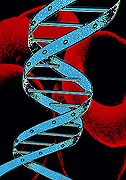healthnewslink
Cancer Newsletter
October 1, 2012 |
| In this Issue |
|
|
|
|
Breast Cancer Drug Linked to Sexual Problems in Older Women
Study found those on aromatase inhibitors reported more pain during intercourse
 FRIDAY, Sept. 28 (HealthDay News) -- Postmenopausal women treated for breast cancer with drugs known as aromatase inhibitors have high rates of sexual problems, which is an important and underestimated issue, according to a new study from Sweden.
Nearly three-quarters of these women reported insufficient lubrication, 56 percent had pain during intercourse, half said their sexual interest was low, and 42 percent were dissatisfied with their sex life.
These percentages are much higher than for postmenopausal women who weren't treated for beast cancer, according to researchers Dr. Juliane Baumgart and colleagues at Orebro University and Uppsala University.
The study was published online this month in Menopause and appears in the February 2013 print issue of the journal.
Women taking tamoxifen for breast cancer treatment also had low sexual interest and more pain with intercourse, but had far fewer problems than women taking aromatase inhibitors, the study found.
Aromatase inhibitors block formation of estrogen from other hormones in the body. This may help prevent breast cancer recurrence and improve survival, the researchers explained in a journal news release.
However, there is a lack of effective treatment for the sexual side effects of aromatase inhibitors. Further research is needed to learn more about the causes and impact of these side effects in order to improve breast cancer survivors' quality of life, the researchers concluded.
While the study found an association between this class of drugs and sexual problems, it did not prove a cause-and-effect relationship.
More information
The American Cancer Society has more about aromatase inhibitors  . .

|
Colon Cancer Gene Database May Assist Research Efforts
Study collection helps scientists pinpoint disease risk factors
 WEDNESDAY, Sept. 26 (HealthDay News) -- A colorectal gene database will help further research into the disease, a new study suggests.
The CRCgene database gathers all genetic association studies on colorectal cancer. It allows researchers to accurately interpret the risk factors of the disease and provides insight into the direction of further research, according to Julian Little, with the department of epidemiology and community medicine at the University of Ottawa, and colleagues.
To determine the genetic factors associated with colorectal cancer, they analyzed data from all published genetic association studies on colorectal cancer.
The researchers identified 16 independent gene variants with the strongest links to colorectal cancer, among 23 variants, a number lower than expected. Unfortunately, the researchers say, this reduces the feasibility of combining variants as a profile in a prediction tool to identity people who are at increased risk for colorectal cancer and who should be screened for the disease.
Even so, the analysis "provides a resource for mining available data and puts into context the sample sizes required for the identification of true associations," the researchers wrote in the Sept. 27 issue of the Journal of the National Cancer Institute.
About 950,000 new cases of colorectal cancer are diagnosed each year, according to a journal news release. Risk factors for the disease include age, diet, lifestyle and possibly genetics.
More information
The U.S. Centers for Disease Control and Prevention has more about colorectal cancer.

|
Young Cancer Survivors Say Costs Hinder Follow-Up Care
Regular health visits needed to monitor for late effects, researchers say

MONDAY, Sept. 24 (HealthDay News) -- Many teen and young adult cancer survivors in the United States go without routine medical care because it's too expensive, a new study finds.
Medical care in the years after a cancer diagnosis is important for detecting any long-term health effects associated with cancer treatment, said Anne Kirchhoff, of the Huntsman Cancer Institute at the University of Utah in Salt Lake City, and her colleagues.
They looked at national survey responses from nearly 1,000 adults aged 20 to 39, who were diagnosed with cancer between the ages of 15 and 34. It had been at least five years since their diagnosis. The cancer survivors were compared with more than 67,000 young adults with no history of cancer.
The cancer survivors and those without cancer had similar rates of uninsurance (21 percent and 23 percent, respectively), but cancer survivors were 67 percent more likely to forgo routine medical care in the previous year because of costs.
Medical care cost barriers were especially high for cancer survivors aged 20 to 29 (44 percent vs. 16 percent of the control group), female cancer survivors (35 percent vs. 18 percent) and survivors who reported poorer health.
The study was published online Sept. 24 in the journal Cancer.
"The Affordable Care Act is an important step to ensuring that adolescent and young adult cancer survivors have health insurance coverage and improving their health care access," Kirchhoff said in a journal news release. "However, they need to be educated about the importance of regular health care to monitor for late effects."
"Furthermore, even the insured survivors in our study reported unmet health care needs due to cost barriers, suggesting that adolescent and young adult cancer survivors need resource supports beyond health insurance," she added.
More information
The U.S. Centers for Disease Control and Prevention has more about cancer survivorship.

|
Lab Contamination Behind Debunked Link Between Virus, Prostate Cancer
'XMRV' also once thought to cause chronic fatigue syndrome
 THURSDAY, Sept. 20 (HealthDay News) -- A new study confirms that a once-promising discovery linking prostate cancer to a retrovirus called XMRV was the result of laboratory contamination.
The link was first proposed more than six years ago when XMRV's "signature" was detected in genetic material derived from tissue samples taken from prostate cancer patients. It raised hopes that using antiviral drugs to block XMRV could prevent prostate cancer.
Follow-up studies, however, failed to find the same signature and researchers concluded that XMRV is an infection of human prostate cancer cells in laboratories and not of prostate cancer patients.
The current study was published Sept. 18 in the journal PLoS One.
In this new study, researchers conducted a forensic analysis of tissue samples and lab experiments -- some dating back nearly a decade -- and confirmed that the reported link between XMRV and prostate cancer was the result of laboratory contamination.
The contamination occurred when traces of XMRV from other cells being handled in the same laboratory found their way into the prostate tissue samples, the team of scientists concluded.
"Everything arose from this presumed contamination event," study co-author Dr. Charles Chiu, assistant professor of laboratory medicine at the University of California, San Francisco, and director of the UCSF-Abbott Viral Diagnostics and Discovery Center, said in a university news release.
The researchers noted that they used newly developed technologies. They said if these scientific tools were available when the link between XMRV and prostate cancer was first suggested, it's likely that the contamination would have been identified far sooner.
Previous research also detected XMRV among tissue samples taken from people with chronic fatigue syndrome. But the original study linking XMRV and chronic fatigue syndrome has since been retracted.
More information
The American Cancer Society has more about prostate cancer  . .

|
| Copyright © 2012 ScoutNews, LLC. All rights reserved. |
|